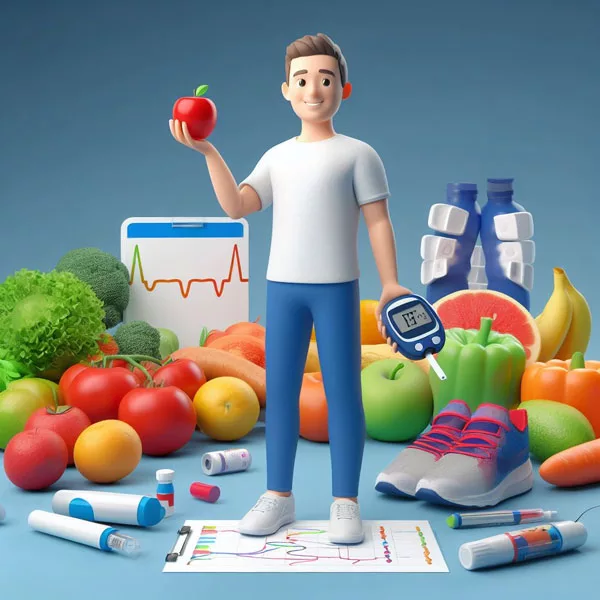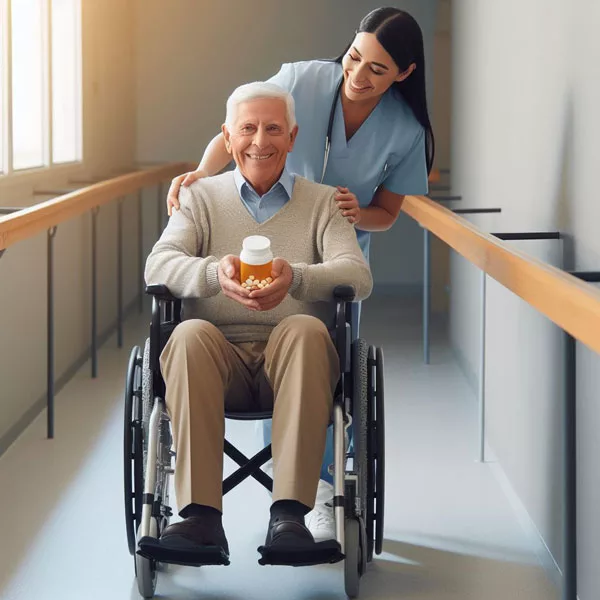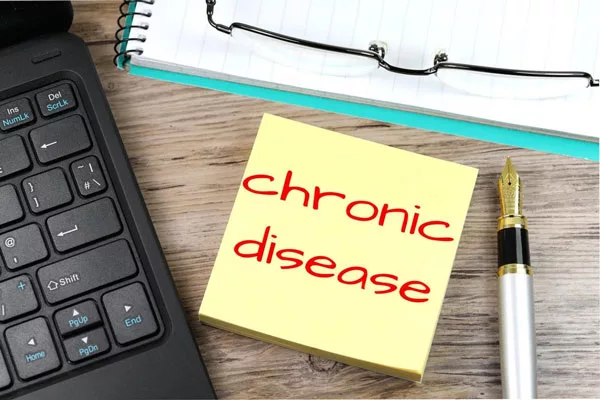Managing Diabetes in Retirement: A Comprehensive Guide to a Healthier Lifestyle
- Introduction
- Understanding Diabetes
- Diet and Diabetes
- Best Food for Diabetes
- Exercise and Diabetes
- Diet and Exercise
- Lifestyle Changes for Diabetes
- Lifestyle Changes for Type 2 Diabetes
- Creating a Diabetes Plan
- Diabetes Plan
- Guidelines and Tips for Good Diabetes Control
- Diabetes Guidelines
- Tips for Diabetes Control
- Conclusion
- Frequently Asked Questions
Introduction
Retirement is supposed to be a time to relax, travel and indulge in hobbies. But for many seniors, it’s also a time to manage diabetes.
Knowing how to balance the joys of retirement with the responsibilities of can make all the difference.
In this guide we will dive deep into the world of diabetes management for retirees, giving you tips, insights and strategies to enjoy your golden years to the fullest while keeping your health in check.
Understanding Diabetes
Diabetes, often referred to as the ‘silent killer’, is a condition where the body either doesn’t produce enough insulin or can’t use the insulin it produces. Older adults have unique diabetes management needs due to age related changes, comorbidities and increased risk of complications.
There are two main types: Type 1, where the body doesn’t produce insulin at all and Type 2, where the body doesn’t use insulin properly. The latter is more common, especially among seniors. Diabetes mellitus is the medical term for this group of metabolic disorders characterized by high blood sugar levels over a prolonged period. Diabetes in older adults may present differently, often with atypical symptoms or complications.
At its core, diabetes is all about blood sugar levels and how the body manages it. Elderly patients, an older patient or older patients may experience different symptoms or face unique challenges in managing their condition, such as increased risk of hypoglycemia or difficulties with medication management.
To diagnose diabetes, healthcare providers often use A1C and other blood tests to diagnose diabetes, especially in older adults, as age related factors can affect test accuracy and interpretation. Individualized care for the older adult is essential, taking into account their overall health, functional status and personal treatment goals.
Diet and Diabetes
Remember the old saying, “You are what you eat”? Well, when it comes to diabetes, your diet is key.
Medical nutrition therapy is a vital part of diabetes management in older adults as it involves creating individualized dietary plans to address age related challenges and improve glycemic control.
Dietary changes can support weight loss in those who are overweight which may help improve glycemic control and overall health outcomes. But it’s also important to monitor for unintentional weight loss in elderly patients as this can be a sign of frailty or other health issues.
Best Food for Diabetes Control
A balanced diet is essential. Foods high in fiber like whole grains, beans and lentils are great options. Vegetables especially non-starchy ones like spinach, carrots and broccoli should be a staple.
Fruits in moderation due to their natural sugars can also be included. And let’s not forget about lean proteins like chicken, fish and tofu. On the other hand, it’s wise to limit foods high in added sugars, unhealthy fats and sodium.
Exercise and Diabetes
If diet is one side of the diabetes management coin, exercise is the other. A tailored exercise program for older adults with diabetes can improve glycemic control, enhance physical function and prevent falls.
Physical activity is a key component of lifestyle modification which is the foundation of diabetes management for older adults. However, chronic pain is a common issue in this population and can be a barrier to exercise so it should be considered when planning activity.
Diet and Exercise for Blood Glucose Management
Regular physical activity can increase insulin sensitivity. This means your body will need less insulin to transport sugar into your cells. For seniors, exercises like walking, swimming or even yoga can be beneficial.
The key is consistency. And remember, always consult with a healthcare professional before starting any new exercise regimen. Participating in a structured diabetes prevention program, such as the Diabetes Prevention Program (DPP), can provide older adults with effective lifestyle modification strategies, including diet, exercise and behavioral support to reduce the risk or delay the onset of type 2 diabetes.
Lifestyle Changes for Diabetes Management
Beyond diet and exercise, other lifestyle factors play a big role in diabetes management.
Good disease control is essential to prevent complications and overall health in older adults with diabetes.It’s important to identify risk factors and associated risk factors such as comorbidities and individual health considerations to tailor management strategies and reduce the risk of complications.
Geriatric syndromes like cognitive impairment, depression and falls can further impact lifestyle choices and complicate diabetes management in older adults.
Lifestyle Changes for Type 2 Diabetes
Stress, believe it or not, can affect your blood sugar levels. Finding ways to manage stress whether through meditation, hobbies or simply spending time with loved ones can be beneficial. Regular health check-ups are a must.
Monitoring blood sugar levels, keeping track of medications and ensuring you’re on the right path is crucial. In older adults, the use of glucose lowering medications and oral hypoglycemic agents should be carefully considered with attention to choosing options that minimize side effects. Individualized diabetes medications and drug therapy is important to reduce the risk of hypoglycemia especially in this population. And let’s not forget about the importance of a good night’s sleep and staying hydrated.
Creating a Diabetes Management Plan
Having a plan is like having a roadmap for a long journey. Working with a diabetes educator can help you create a personalized management plan tailored to your needs. Diabetes education is essential for patients with diabetes as it improves self-management, supports behavioral changes and helps achieve individualized treatment goals. Including blood glucose monitoring in your plan is crucial for tracking progress and making necessary adjustments. It guides you, keeps you on track and ensures you reach your destination safely.
Diabetes Plan
Start by setting clear, achievable goals. Whether it’s maintaining a specific weight, keeping blood sugar levels within a certain range or even something as simple as walking 30 minutes a day. Establishing individualized glycemic targets is important as optimal glycemic control can help balance the benefits and risks of treatment in older adults.
When setting diabetes management goals for older adults, it’s important to consider life expectancy and in cases of limited life expectancy to adjust treatment intensity and medication regimens accordingly.
Regularly consult with healthcare professionals. They can guide you, monitor your progress and make necessary adjustments to your plan. Remember, flexibility is key. As your health changes, so should your plan.
Guidelines and Tips for Good Diabetes Control
There’s so much information out there on diabetes management. The European Diabetes Working Party and the International Diabetes Federation both have guidelines for diabetes care in older adults.
Guideline-based strategies emphasize the need to control cardiovascular risk and prevent macrovascular complications, microvascular complications and other diabetes related complications through regular screening, monitoring and individualized treatment approaches.
But how do you separate the wheat from the chaff?
Diabetes Guidelines
Globally recognized guidelines such as those from the World Health Organization or the American Diabetes Association provide a solid foundation. They offer evidence-based recommendations that can be trusted.
In older adults with diabetes, it’s essential to assess cardiovascular risk and prioritize the prevention of cardiovascular disease and atherosclerotic cardiovascular disease through tailored management strategies. For those with established cardiovascular disease, secondary prevention measures including aspirin therapy and lipid-lowering agents are recommended to reduce the risk of recurrent events. Comprehensive diabetes management should also include regular monitoring for chronic kidney disease, kidney disease, kidney failure, impaired renal function and end stage renal disease as these complications significantly impact treatment decisions and outcomes in this population.
Tips for Diabetes Control
Here are some easy tips:
- Monitor fasting plasma glucose and blood glucose levels regularly to assess glycemic control.
- Keep blood pressure within your target range to reduce cardiovascular risk.
- Check your estimated glomerular filtration rate (eGFR) periodically to monitor kidney function especially if you are on diabetes medications.
- Consider continuous glucose monitoring (CGM) if you have difficulty with traditional monitoring or if A1C results may be unreliable.
- Discuss with your healthcare provider the pros and cons of sliding scale insulin, as it may not always provide optimal control and whether switching to a once daily basal insulin could simplify your regimen and reduce hypoglycemia risk.
- Take medications as prescribed.
- Stay active, both mentally and physically.
- Watch your diet, but don’t deprive yourself. Moderation is key.
- Stay informed. The more you know, the better equipped you’ll be.
Conclusion
Managing diabetes in retirement may seem daunting but with the right approach it’s more than manageable. It’s an opportunity to live your best life.
So, embrace the challenge, arm yourself with knowledge and enjoy those golden years to the fullest!
Frequently Asked Questions
What are the first steps in managing diabetes in retirement?
Start with a comprehensive check-up with your healthcare provider. For older adults with diabetes it’s especially important to have a thorough assessment that includes screening for complications and comorbidities. Know your current health status, get your blood sugar levels checked and discuss any changes in medication or lifestyle.
How important is diet in diabetes management?
Diet is key. A balanced diet with controlled carbohydrates can help maintain stable blood sugar levels. Consult a nutritionist who can provide a personalized meal plan.
Can I travel if I have diabetes?
Yes! Just bring your medications, monitor your blood sugar regularly and make provisions for healthy meals.
Are there specific exercises for seniors with diabetes?
Low-impact exercises like walking, swimming and yoga are good. Always consult with a fitness expert or your doctor before starting any exercise program.
How often should I monitor my blood sugar levels?
Frequency varies based on type of diabetes and your current health status. Those on insulin may need to check more often. Always follow your doctor’s advice.
What are the signs that my diabetes isn’t well-managed?
Frequent thirst, unexplained weight changes, constant fatigue and blurred vision are some signs. Recognizing symptomatic hyperglycemia (high blood sugar with symptoms) and severe hypoglycemia (dangerously low blood sugar that can cause falls, injuries or even coma) is also important as these are warning signs of poor diabetes management. Monitoring for cognitive dysfunction in older adults with diabetes is also crucial as it can interfere with self-care and increase the risk of complications. If you experience these, consult your healthcare provider immediately.
Can stress affect my blood sugar levels?
Yes, stress can raise blood sugar levels. Find stress-relieving activities like meditation, reading or hobbies to maintain a balanced mental state.
Are there new diabetes management guidelines I should know about?
Medical guidelines change. It’s good practice to stay updated by consulting your healthcare provider and attending diabetes workshops or seminars regularly.
What foods are good for diabetes control?
Foods high in fiber like whole grains, leafy greens and certain fruits are great. Lean proteins, nuts and seeds are also good. Limit processed foods and those high in sugar.
How lifestyle changes help with type 2 diabetes?
A balanced diet, regular exercise, stress management and no tobacco and excessive alcohol can help with blood sugar control and overall health.
Remember to consult your healthcare provider for personalized advice.




3 Comments
Comments are closed.